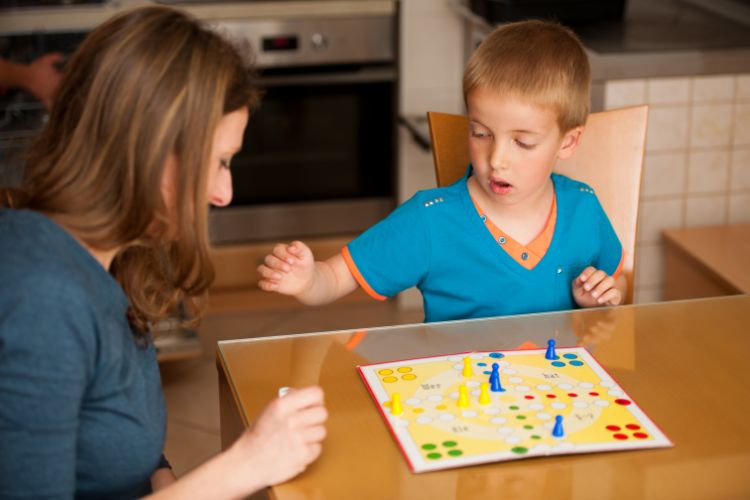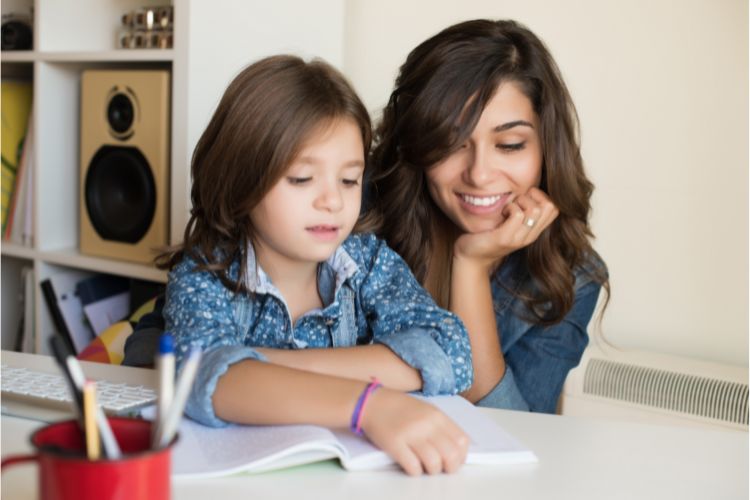Wouldn’t it be amazing to have a peek inside your child’s mind? To truly understand their struggles, triumphs, and how those incredible brains are constantly learning and adapting? If you’re looking for ways to foster deeper understanding and connection with your child, Reflective Learning for Parents is the key! It’s about intentionally pausing to think about experiences, fostering open conversations, and nurturing a “growth mindset” where both you and your child see challenges as exciting opportunities. Let’s discover how to implement reflective learning in your home, transforming it into a hub of curiosity, resilience, and a shared love of lifelong learning!
What Is Reflective Learning?
Reflective learning encourages both children and adults to step back and thoughtfully analyze past experiences, actions, and knowledge. It’s about asking questions, uncovering deeper insights, and identifying ways to improve and grow. As a parent, supporting reflective learning in your child offers a wealth of benefits.
Boosts Self-Awareness
Children develop a better understanding of their strengths, learning styles, and preferences, empowering them to become independent learners.
Develops Critical Thinking Skills
Asking reflective questions helps children analyze information, consider multiple perspectives, and make informed decisions.
Enhances Problem-Solving Abilities
Kids learn to break down challenges, brainstorm solutions, and evaluate the outcomes, becoming more resourceful problem-solvers.
Promotes Resilience
By reflecting on setbacks, children learn to see them as springboards for growth, fostering grit and perseverance.
Nurture a Growth Mindset
Reflective learning shifts the focus from fixed abilities to the power of effort and improvement, cultivating a lifelong love of learning.
How Can Parents Introduce Reflective Learning at Home?
Integrating reflective learning into your home doesn’t require elaborate setups or being an educational expert. Here are simple yet impactful ways to get started:
The Power of Questions
- Go beyond the standard “How was your day?” Try questions like “What did you find most interesting at school today?”, “Tell me about a time you felt really proud of yourself today”, or “What was the most challenging part of your day, and why?”
- Shift the focus to process: Instead of emphasizing grades or outcomes, ask questions like “How did you tackle that difficult math problem?” or “What strategies did you use on your writing assignment?”
- Encourage self-reflection: Inspire your child to think about their own thinking with questions like “How did you feel about the way you handled that disagreement with your friend?” or “If you could do it again, is there anything you’d do differently next time?”
Helpful Hint:
Tailor your questions to your child’s age and developmental stage. For younger children, use playful scenarios with toys or drawings to spark reflection. Older children may benefit from journaling or quiet, one-on-one conversations.
Making Reflection a Shared Experience
- Model reflective thinking: Talk about your own day, successes, setbacks, and lessons learned. This shows your child the value of reflection.
- Emphasize both wins and challenges: Successes deserve celebration, while challenges present the greatest growth opportunities. Frame setbacks as learning experiences.
- Create a “no-judgment zone:” Establish a safe, encouraging space where your child feels comfortable sharing without fear of criticism or unsolicited advice.
Transforming Challenges and Activities with Reflective Learning
Turning Setbacks into Stepping Stones
Life throws curveballs, and children are no exception. Here’s how to use reflective learning to navigate challenges and setbacks constructively:
- Acknowledge Emotions: Before diving into solutions, validate your child’s feelings. Phrases like “That sounds frustrating/disappointing. Tell me more about it” show empathy and create a safe space for open communication.
- Explore What Happened: Encourage your child to retrace their steps. Ask questions like “Can you walk me through how you approached that test/project?” This helps identify areas for improvement and build self-awareness.
- Problem-Solve Together: Brainstorm solutions collaboratively. Instead of dictating answers, ask “What are some strategies you could try next time?” or “Do you think there are any resources that might be helpful?” This fosters critical thinking and problem-solving skills.
- Focus on Effort and Strategies: Applaud your child’s perseverance and willingness to try different techniques. Phrases like “I’m so proud of how hard you worked on that” or “It’s great that you’re trying different approaches” emphasize the learning process over simply achieving the end result.
Helpful Hint:
Tailor your approach to your child’s age. Younger children might benefit from using simple visuals or drawing out solutions. For older children, role-playing challenging scenarios can be a helpful strategy.
Everyday Activities as Learning Adventures
Learning isn’t confined to classrooms! Here are some ways to transform everyday activities into springboards for reflection:
Errands as Learning Expeditions
- After grocery shopping: Discuss how you categorized items or planned meals together. Ask your child, “What did you learn about healthy eating choices today?”
- Following a doctor’s visit: Talk about what they learned about their body and health. Encourage them to reflect on how they can take better care of themselves.
Mealtimes as Meaningful Moments
- Make mealtimes opportunities for conversation. Discuss the day’s highlights, challenges, and anything interesting learned at school.
- Reflect on the origins of food: Chat about where food comes from. Discuss a recent grocery shopping trip or a visit to a farmer’s market. This fosters an appreciation for the journey food takes before reaching their plate.
Transform Screen Time into Reflective Time

- After watching a movie/show: Discuss the characters’ choices, the consequences of their actions, and the lessons learned. Ask questions like “What would you have done differently in that situation?” or “How did the characters handle challenges?”
- Pause educational games: Take breaks to discuss strategies used, challenges encountered, and new concepts learned. Ask your child, “What was the most difficult part of the game? How did you overcome it?”
Making Reflection a Family Ritual
Here are some ideas to create a family culture of reflection that goes beyond everyday activities:
- Start a Gratitude Jar: Encourage everyone in the family to write down things they’re grateful for each day. Take turns sharing and reflecting on these blessings during dinner or family time.
- Hold Family Meetings: Dedicate time for regular family meetings. Discuss challenges faced as a family, brainstorm solutions together, and celebrate successes. This fosters teamwork, communication, and a sense of shared purpose.
Reflective Learning: A Gift for Parents Too!
Reflective learning isn’t just a magic bullet for boosting your child’s development; it’s a powerful tool for your own personal growth! Here’s how embracing reflective learning can empower you as a parent:
- Enhances Self-Awareness: As you reflect on your parenting experiences, you gain a deeper understanding of your strengths, weaknesses, and triggers. This self-awareness allows you to navigate challenges more effectively and build stronger relationships with your child.
- Strengthens Communication Skills: Reflective learning encourages active listening and open communication. By reflecting on conversations with your child, you can identify areas for improvement and tailor your communication style to better connect with them.
- Promotes Patience and Empathy: Reflecting on your own childhood experiences and emotional responses can foster empathy for your child’s feelings. Understanding the “why” behind their behavior can lead to more patient and compassionate responses.
- Develops Problem-Solving Skills: Parenting throws its fair share of curveballs. Reflective learning equips you to analyze challenging situations, brainstorm solutions, and learn from your experiences. You become a more resourceful and adaptable parent.
- Lifelong Learning Mindset: Reflective learning fosters a growth mindset, encouraging you to see challenges as opportunities to learn and grow. This mindset extends beyond parenting, enriching all aspects of your life.
Putting Reflective Learning into Action for Parents
Now that you understand the benefits, let’s explore some practical ways to integrate reflective learning into your own life:
- Journaling: Dedicate time for daily or weekly journaling. Reflect on your interactions with your child, successes, challenges, and areas where you’d like to improve.
- Mindfulness Practices: Techniques like meditation or mindfulness exercises can help you become more present in the moment and approach situations with greater awareness. This heightened awareness is crucial for reflective learning.
- Connect with Other Parents: Sharing experiences and challenges with other parents in support groups or online forums can be a valuable source of reflection. Discussing different approaches and perspectives can spark new insights.
- Seek Professional Guidance: Don’t hesitate to seek professional guidance from therapists, counselors, or parenting coaches. They can provide a safe space for reflection, offer tailored strategies, and support you on your parenting journey.
Pros and Cons of Reflective Learning for Parents
Pros
- Boosts child’s self-awareness and problem-solving skills.
- Strengthens the parent-child relationship through open communication.
- Encourages a growth mindset in both children and parents.
- Helps parents navigate challenging situations more effectively.
- Enhances parental patience and understanding.
Cons
- Requires a time commitment from parents.
- Focusing on setbacks or difficulties can be emotionally challenging.
- Might feel awkward or unnatural at the beginning, especially if open communication is not a regular practice.
- Requires willingness for both parents and children to be vulnerable and introspective.
FAQs
Wrapping Up
Reflective learning is a powerful tool for parents and children alike. By fostering open communication, celebrating both successes and challenges, and embracing a growth mindset, you create a home environment where everyone learns and thrives together. Remember, it’s a journey, not a destination. Start with small changes, be patient with yourself and your child, and watch the incredible benefits of reflective learning unfold!
